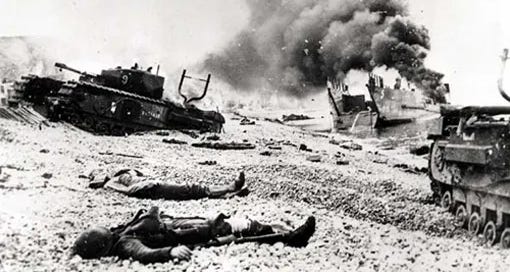PROLOGUE: This essay was published in the National Post on August 19,2022 under the title Remembering the Dieppe Raid 80 years later. It has been slightly modified for Substack.
“The Canadians are 1st class chaps; if anyone can pull it off, they will.”
Field Marshal Bernard Montgomery was optimistic ahead of the raid at Dieppe, France, on Aug. 19, 1942. While the soldiers of the Canadian Army were indeed first-class soldiers, in the end, they did not pull it off.
By the end of the battle over 3,300 Canadian troops had been killed or wounded and almost 2,000 were taken prisoner by the Germans. Dieppe was Canada’s greatest military defeat and this made it difficult to comprehend and to properly commemorate. In the years following the war, Prime Minister King and others claimed the defeat allowed for lessons to be learned for later victory at Normandy, but that does not tell the real story.
The Great War demonstrated Canadian bravery and operational excellence on the battlefield, which in turn, helped Canada come of age. Ypres, Hill 70 and the iconic victory at Vimy Ridge saw the Canadian Army distinguish itself with courage and military prowess. The losses in these battles were steep — far greater in number to those experienced a generation later at Dieppe — but the victories seemed to justify the sacrifice and dampen the pain. These bloody battles had allowed Canada to join the pantheon of countries who were willing to sacrifice blood and treasure for the common good. Our allies noticed and the names of these battles became immortalized.
The Second World War, on the other hand, began with stinging and deeply tragic military defeats for the Canadian Army. This made it much harder to accept the loss of life and almost impossible to mythologize these battles in the hearts of Canadians. Brave troops from the Royal Rifles and Winnipeg Grenadiers were the first to face combat when they were sent to Hong Kong with the impossible objective of defending the garrison from impending Japanese invasion. Just days after their Christmas Day surrender in Hong Kong in 1941, Sir Winston Churchill visited Canada and delivered his now famous “some chicken, some neck” speech to Parliament. He fretted about the losses at Hong Kong and tried to justify the sacrifice by saying our soldiers had gained “precious days” for the colony ahead of the surrender.
By the summer of 1942, Canadian leadership wanted to turn the page on the loss at Hong Kong and have our troops see action in Europe. Canada pushed to have the 2nd Canadian Infantry Division lead the assault on German positions at Dieppe alongside some British and American commandos. Despite months of training and tremendous bravery, Canada experienced a similar defeat to that in Hong Kong, taking heavy casualties and having our soldiers taken prisoner. The losses at Dieppe were even harder to accept because the raid was a carefully planned offensive action we volunteered for and not the loss of an impossible to defend position. Canadian lives appeared to be sacrificed for precious little and that left Dieppe on a much different pedestal when compared with Vimy or later victories like Normandy.
So what was our objective at Dieppe? Was it to test the German defences and learn the lessons needed for a future amphibious assault like the D-Day landings years later? Was Dieppe a doomed mission launched to placate a nervous Russian ally who was experiencing heavy losses on the Eastern Front? Did Dieppe only proceed because of the hubris of a senior military leader who had been promoted up the ranks because of powerful friends? Or, was the Dieppe Raid actually a diversion for a secret commando pinch mission intended to steal a German enigma coding machine to change the tide of the war?
Declassification of top secret documents from the war now indicate that the true intention of the Dieppe Raid was not a lessons learned exercise, but a pinch mission intended to capture Enigma coding materials. A mission led by Lord Mountbatten and none other than James Bond author Ian Fleming as his right hand. The invasion of a stony French beach was actually a pinch mission designed to give the allies’ brilliant mathematicians at Bletchley Park a chance at decoding German transmissions as the updated their cryptology during the war. Canadian historian and veteran David O’Keefe has explored this secret mission in great detail in his book One Day in August. I had David speak about the mission and his book in a Blue Skies podcast last year for the 80th Anniversary. It is linked at the bottom of this essay.
Whether the loss at Dieppe was for this pinch mission or a combination of mission objectives, it is important for us to remember the service and sacrifice of our citizens regardless of mission success. Commemoration is not about the glory of the triumph or the strategic importance of the objective, it is about honouring the citizens who put the country above themselves. It means keeping the stories alive of the selflessness of Canadians who fought heroically far from home. Canadians like Padre John Foote from the Royal Hamilton Light Infantry who refused evacuation from the beach at Dieppe in order to be taken prisoner with his wounded men. Canadians like the twice-wounded Cecil Merritt who courageously commanded the South Saskatchewan Regiment throughout the Dieppe Raid with no thought of his own safety. Their heroism and care for their fellow soldiers was unconditional and part of their character and not connected with any objectives. We should celebrate and remember such valour. Pro Patria.
A Day in August: 80 Years After the Dieppe Raid
Listen now (51 mins) | Dieppe historian David O’Keefe joins Erin for a special commemorative edition of the Blue Skies Podcast. They discuss the challenges of the raid, Canadian bravery on the beach, and the intrigue behind the secret ‘pinch mission’ at the heart of the mission. Spymaster & Bond author Ian Fleming even played a role in this daring mission to break Nazi codes.…







What a read! Can't wait to listen to it.
Thank you again!
Thank you so very much for this, Erin. We of course never learned in high school history classes about the real purpose behind the Dieppe raid. We did learn about the bravery of our Canadian troops that day.